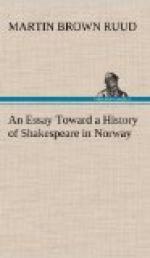“This falls out better than I could devise.”
and resumes with Oberon’s words:
“I’ll to my queen and beg her Indian boy,”
and includes (with the omission of the last two lines) Oberon’s speech beginning:
“But we are spirits of another sort.”
Eggen then jumps to the fourth act and translates Titania’s opening speech. After this there is a break till the entrance of Oberon. The dialogue between Titania and Oberon is given faithfully, except that in the speech in which Oberon removes the incantation, all the lines referring to the wedding of Theseus are omitted; the speeches of Puck, Oberon, and Titania immediately preceding the entrance of Theseus, Hippolyta, Egeus, and their train, are rendered.
From Act V the entire second scene is given.
Eggen has, then, attempted to give a translation into Norwegian Landsmaal of the fairy scenes in A Midsummer Night’s Dream. He has confined himself severely to his task as thus limited, even cutting out lines from the middle of speeches when these lines refer to another part of the action or to another group of characters. What we have is, then, a fragment, to be defended only as an experiment, and successful in proportion as it renders single lines, speeches, or songs well. On the whole, Eggen has been successful. There is a vigor and directness in his style which, indeed, seem rather Norwegian than Shakespearean, but which are, nevertheless, entirely convincing. One is scarcely conscious that it is a translation. And in the lighter, more romantic passages Eggen has hit the right tone with entire fidelity. His knowledge is sound. His notes, though exhibiting no special learning, show clearly that he is abreast of modern scholarship. Whenever his rendering seems daring, he accompanies it with a note that clearly and briefly sets forth why a particular word or phrase was chosen. The standard Danish, Norwegian, and German translations are known to him, and occasionally he borrows from them. But he knows exactly why he does borrow. His scholarship and his real poetic power combine to give us a translation of which Landsmaal literature has every reason to be proud. We need give only a few passages. I like the rollicking humor of Puck’s words:
Kor torer uhengt kjeltrings pakk daa skvaldre so naere vogga hennar alvemor? Kva?—skodespel i gjerdom? Eg vil sjaa paa— kann hende spele med, um so eg synest.
And a little farther on when Bottom, adorned with his ass’s head, returns with Puck, and the simple players flee in terror and Puck exclaims:
Eg fylgjer dykk og forer rundt i tunn, i myr og busk og ormegras og klunger, og snart eg er ein hest og snart ein hund, ein gris, ein mannvond bjorn, snart flammetungur, og kneggjer, goyr og ryler, murrar, brenn, som hest, hund, gris, bjorn, varme—eitt um senn.
we give our unqualified admiration to the skill of the translator. Or, compare Titania’s instructions to the faries to serve her Bottom:




